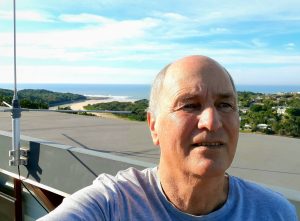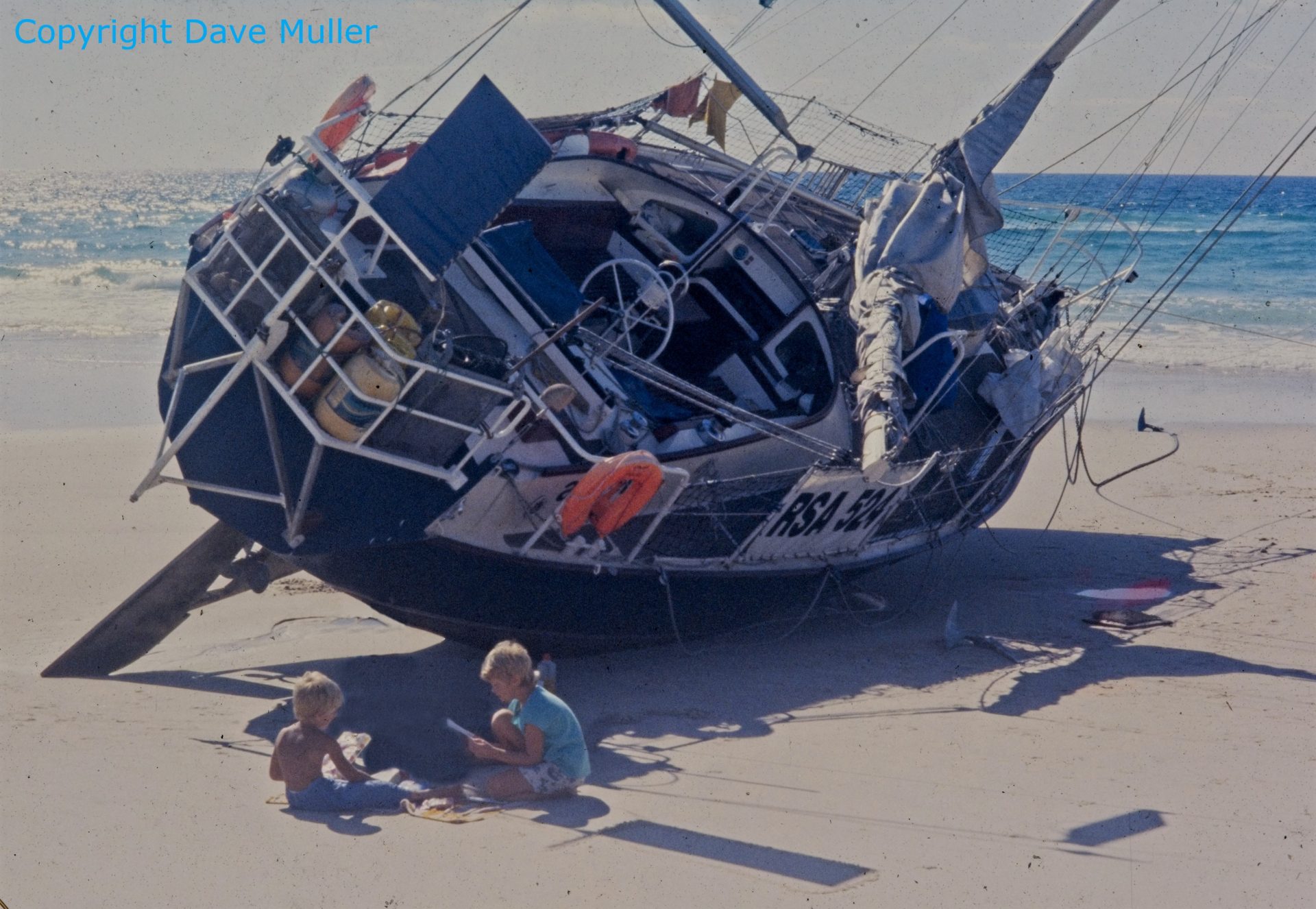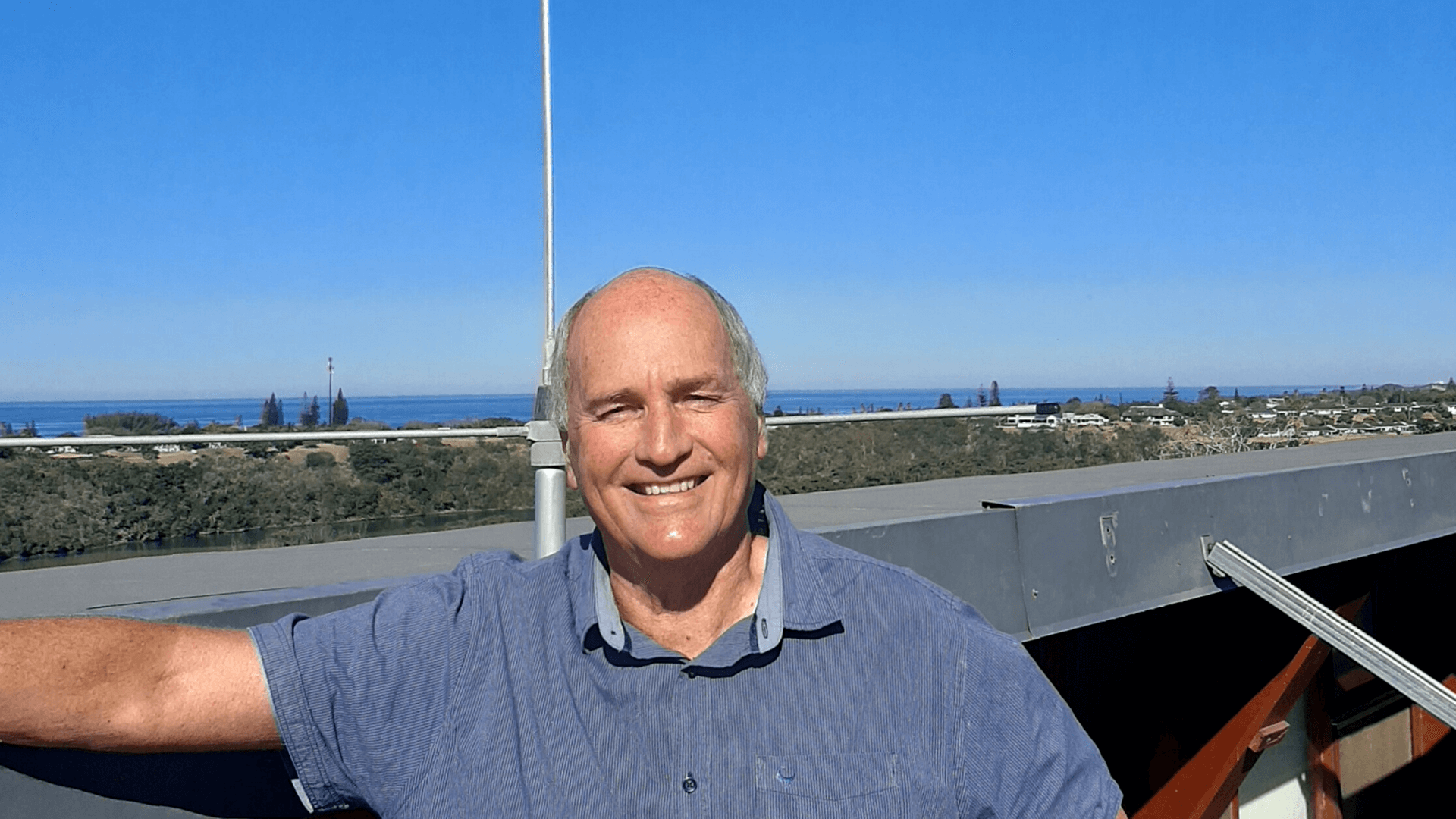We are happy to get an interview with one of our AIS Data contributors who authored the book “Not Child’s Play”. He is one of the many AIS station owners who believe that regardless of whether or not you have technical background or involvement in maritime business, you can put up a station to simply contribute to the safety of sailors at sea.
Let’s meet Dave Muller, who personally experienced the trauma of being shipwrecked and disappeared off the face of the Earth, and no one, either his family or friends, knew where they were.

This is Dave Muller, a retired architect.
His main interest these days is promoting sustainable lifestyles and communities. To this end, he’s been involved with the development of an Ecovillage near the city of East London in South Africa for the last 20 years. After he retired, he spent three years building (with one helper) a timber and rammed-earth sustainable, off-grid house for himself and his wife. Their home is overlooking the Indian Ocean and the estuary of the Gonubie River. Read our full interview below.
How did you first hear about MarineTraffic and what made you decide to become a station owner?
While building the house, I’d often look out to sea and watch the passing ships, wondering where they were from and where they were headed. Took a chance through Google search, and I discovered MarineTraffic. I noticed, to my surprise, that there are clearly-defined shipping lanes, and the lane heading up and down the east coast of Africa converged with the shipping lane from the Malacca Straits just offshore from my house. I realised my location is perfect to monitor shipping movements.
I’m also possibly one of the few station owners who had misfortune in their sailing experience. Back in 1990, my yacht ran aground during the hours of darkness. My family and I were captured and held hostage for 49 days by a then terrorist group, called Renamo, in Mozambique.
Apart from all the trauma of becoming embroiled in a very active civil war, the trauma of knowing we had disappeared and no one knew where we were, was profoundly disturbing. That happened in pre-GPS and fledgling-sat nav days.
Services such as AIS ensure this would not happen today, and therefore I applied to become a station owner to add to the security of all ships, but especially yachts, as they round the southern tip of Africa.
 This photo was taken just a few minutes before we were captured. It shows my children enjoying my son’s 5th birthday party in the shade of our yacht as we waited for the next high tide to re-float her.
This photo was taken just a few minutes before we were captured. It shows my children enjoying my son’s 5th birthday party in the shade of our yacht as we waited for the next high tide to re-float her.
What is the best part of operating an AIS receiving station?
I’m endlessly fascinated by the variety of ships passing by. Heavy-lift vessels, often with their extraordinary top-heavy loads of container gantry cranes, are a wonder. Sometimes, they drift offshore from our house as they wait for a favourable gap in the weather to make a dash to round Cape Agulhas before the next cold front with accompanying huge waves passes through.
But a particular interest occurs each year from November through our summer months, as flocks of cruising yachts exit the Indian Ocean to avoid the cyclone season, and creep around the bottom of Africa in what is, for most of them, the most dangerous part of their circumnavigation. I feel a bit like a mother hen watching her chicks as they progress west from Durban. Often, I’ll pick on a few names and track their journey, always feeling some relief when they reach Cape Town.
What were your key takeaways from your captivity?
I had to write a book to cover all the takeaways from our time of captivity but let me highlight just two:
Few emotions are more disabling than hopelessness. We had our two children, aged 5 and 8, with us, so we resolved early on that we had to do all we could to protect them from the reality of the war. We did this by assuming a nonchalant air that these weird happenings and people were all just a rather strange and exciting deviation in our holiday plans, and nothing to worry about.
This was not easy to sustain as deep feelings of guilt, hopelessness and despair often overcame us. We spent seven weeks living in a bush camp with the Renamo boy soldiers (aged 10 to ~20) before we were rescued.

On my book’s cover, you will see a photo of the child soldiers carrying AK-47’s.
On two occasions, the camp was attacked by the Frelimo government army, and we found ourselves fleeing a missile attack in the dark hours before dawn on one occasion, and a mortar bombardment on another. Both were followed-up by fierce infantry attacks. Terrifying as these attacks were, suddenly there was a reason to live. For the boys, this was obviously a thrill that gave their otherwise hopeless lives purpose.
The second takeaway is related. It was frightening to witness how fragile social order can become. At that time, Mozambique was the poorest nation on Earth and a country in ruins due to unwise political policies, destabilization from neighbours resulting in the civil war, and the country becoming a theatre for the fighting of a proxy war between the east and the west.
Probably, like me, you who are reading this can look out upon a stable neighbourhood, and we share a particular interest in tracking the shipping movements – which is another way of watching the ordered world economy transact before us. But it is fragile and needs to be protected.
Our release required a cease-fire to come into place between Frelimo and Renamo. It did. I’ve since returned to Mozambique five times with a mission group from my local church. We attempted to help local communities with economic development and medical aid. These visits were emotionally exhausting for me, but I was amazed to discover how quickly the local people had placed the war behind them.
So the second takeaway is, people are extraordinarily resilient, and it’s vital for our mental and physical health to do all we can to place harmful events behind us and avoid giving or feeling blame.
My book is available as an e-book on trusted e-booksellers like Amazon (kindle app) for up to 20% less than the print book.
And, as a footnote, because you are probably wondering; our children grew up as happy kids and teenagers. Both are now young adults, both married and both with jobs that contribute directly to society. If asked, they would tell you they only have good memories of the time spent as hostages.
Invite a friend to join our community
Send to your friends the link below and help them be part of the world’s largest AIS-Receiving Network: https://www.marinetraffic.com/en/p/expand-coverage
